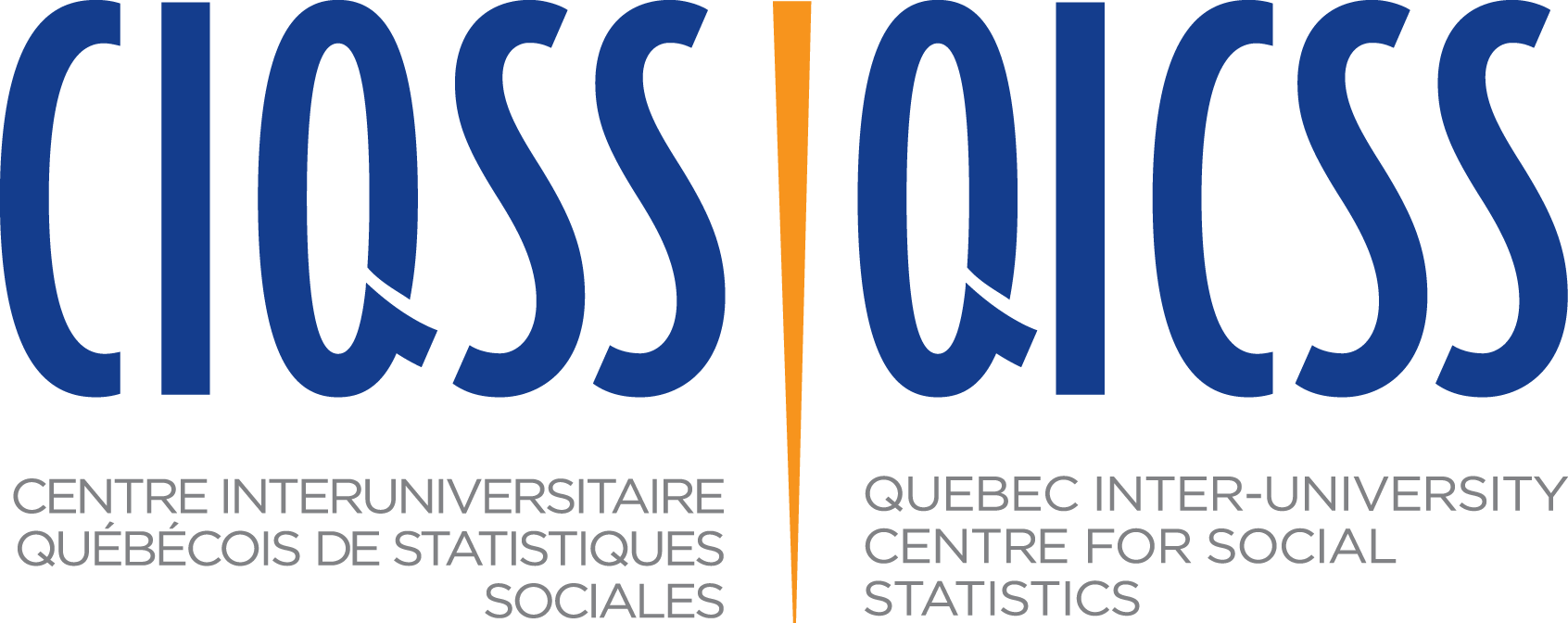Statistics Canada Data
The Quebec Inter-University Centre for Social Statistics (QICSS) offers Quebec's research community secure access to detailed microdata from Statistics Canada's surveys and Canadian censuses, as well as to an increasing number of administrative datasets.
Public-use versions of most cross-sectional surveys are also made available by Statistics Canada. For more information, please visit our Resources page.
Although the procedure varies slightly depending on the type of research and your function, it always comes down to three steps. For detailed procedures based on your situation, please consult the Statistics Canada website.
- Access procedure
- Updating your research contract
- Ethics review document
- Acknowledgments for publications and conference papers
Access procedure
1. Draft a project proposal
The project proposal (usually around 1 to 2 pages, maximum 10 pages) must describe your research and include the following elements:
- Title of the Project;
- Rationale and objectives of the study;
- Proposed data analysis and software requirements;
- Data requirements;
- Expected project start and end dates;
- Expected products;
- Reference (sources used in the proposal or for specific analytical methods employed).
2. Submit the proposal for approval
Researchers must submit their research proposal through the Microdata Access Portal (MAP).
Please note that projects involving academics hired as consultants under a contract from the provincial or federal government or a third party may be considered as cost recovery projects. For more information on the categories of users and possible access fees, please refer to the CRDCN's Access and Fee Service Policy.
3. Sign a contract and obtain a security clearance
Once the research proposal is approved, all members of the team must sign the research contract and complete the security screening process.
The security screening process consists of completing this form, signing an oath of office, attending an orientation session with the Statistics Canada analyst responsible for the project, providing your fingerprints, as well as the following documents depending on your status:
- Canadian researchers born in Canada: a proof of identity with official photo ID;
- Canadian researchers born outside of Canada : a proof of Canadian citizenship;
- Permanent residents : a proof of permanent residence;
- International researchers: a proof of identity with official photo ID, a proof of authorization to be in Canada, a proof of Canadian address and a letter of reference.
* If you are an international self-funded researcher (who is not affiliated with a Canadian university), please contact [email protected] for more information on the required documents.
Detailed procedures
For detailed procedures based on your situation, please consult the Statistics Canada website.
Updating your research contract
- Extending your project or obtaining a revision contract : answer questions 1 & 2.
- Adding data from Statistics Canada : answer questions 1 to 3.
- Adding administrative dataset : answer questions 1 to 3.
- To add or remove a researcher on the project or modify the statement of your work, please send your request by email to [email protected]
Please send your completed form at [email protected]
Ethics review document
Researchers may be required to obtain an ethics review for their research in the RDCs so that their work can be published in certain academic journals. To assist RDC researchers through this evaluation process by an ethic review board, this document explains the steps taken by Statistics Canada and the RDC program to mitigate the risks to respondents.
It is your responsibility to learn the ethics review procedures specific to your institution. If you have any questions, please contact your institution.
Acknowledgments for publications and conference papers
All publications or conference papers making use of results obtained from projects conducted at the QICSS must include a note of acknowledgment for the financial support of the various agencies that support the QICSS and the Canadian Research Data Centre Network (CRDCN). This is a requirement from the various agencies.
The model below is one example of the information that must be included:
The analysis presented in this paper was conducted at the Quebec Interuniversity Centre for Social Statistics which is part of the Canadian Research Data Centre Network (CRDCN). The services and activities provided by the QICSS are made possible by the financial or in-kind support of the Social Sciences and Humanities Research Council (SSHRC), the Canadian Institutes of Health Research (CIHR), the Canada Foundation for Innovation (CFI), Statistics Canada, the Fonds de recherche du Québec - Société et culture (FRQSC), the Fonds de recherche du Québec - Santé (FRQS) and the Quebec universities. The views expressed in this paper are those of the authors, and not necessarily those of the CRDCN or its partners.
Help
If you need help to submit or amend your project, please contact us at [email protected]. If you need help with Microdata Access Portal, please contact [email protected].



